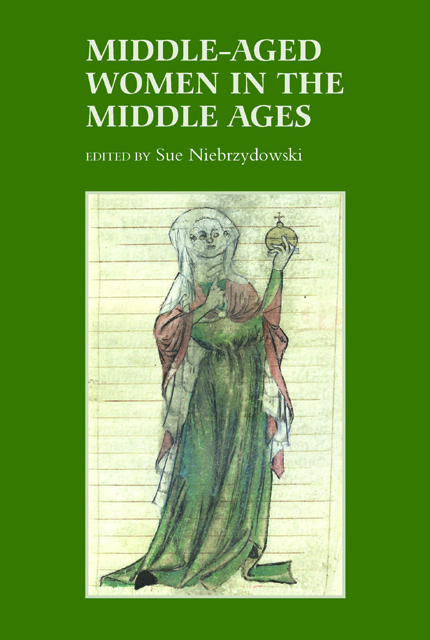Book contents
- Frontmatter
- Contents
- List of Plates
- Abbreviations
- Contributors
- Introduction: ‘Becoming bene-straw’: The Middle-Aged Woman in the Middle Ages
- 1 The Age of Discretion: Women at Forty and Beyond
- 2 Seeking the Middle-Aged Woman in Medieval Wales
- 3 Middle Age in Romance? Magic, Enchantment and Female Power
- 4 Age and Desire in the Old English Life of St Mary of Egypt: A Queerer Time and Place?
- 5 The St Albans Psalter: Sex, Desire and the Middle-Aged Woman
- 6 Speaking Volumes: the Middle-Aged Woman and the Book in Medieval England
- 7 ‘Late hir seye what sche wyl’: Older Women’s Speech and the Book of Margery Kempe
- 8 Preparing for Mature Years: the Case of Margaret of Anjou and her Books
- Select Bibliography
- Index
1 - The Age of Discretion: Women at Forty and Beyond
Published online by Cambridge University Press: 14 February 2023
- Frontmatter
- Contents
- List of Plates
- Abbreviations
- Contributors
- Introduction: ‘Becoming bene-straw’: The Middle-Aged Woman in the Middle Ages
- 1 The Age of Discretion: Women at Forty and Beyond
- 2 Seeking the Middle-Aged Woman in Medieval Wales
- 3 Middle Age in Romance? Magic, Enchantment and Female Power
- 4 Age and Desire in the Old English Life of St Mary of Egypt: A Queerer Time and Place?
- 5 The St Albans Psalter: Sex, Desire and the Middle-Aged Woman
- 6 Speaking Volumes: the Middle-Aged Woman and the Book in Medieval England
- 7 ‘Late hir seye what sche wyl’: Older Women’s Speech and the Book of Margery Kempe
- 8 Preparing for Mature Years: the Case of Margaret of Anjou and her Books
- Select Bibliography
- Index
Summary
A consideration of women’s middle age in the Middle Ages inspires a number of questions: most obviously, at what age was a woman considered middle-aged in this period? Where is she to be found in history and literature? Does the middle-aged woman operate in the public domain or (only) in the domestic sphere? Is she an isolated creature or socially active; an urban or a rural phenomenon? What kinds of social roles did she play: did she make a positive contribution to society or was she only, as retired people are said to be today, a source of concern, of cost and nursing? To what degree was a woman’s middle age affected by her social status? And finally, how did the middle-aged woman perceive herself and how was she perceived by others?
Katharina Tucher is a good test case to evaluate the way in which medieval society perceived wealthy, educated middle-aged women. Katharina, or Catherine, lived in Bavaria from about 1380 to 1448 and was in all probability married to the rich cloth-merchant Otto Tucher. She lived in Neumarkt in the region of Nuremberg for as long as her husband was alive. The couple stemmed from the Nuremberg patriciate but Otto was banned from the city. After his death, at some point between 1418 and 1419, Catherine moved back to the city and began a new stage of her life. This is her middle age after her youth and married life.
Catherine was about forty at the time. From the sources that have survived, mostly documentary and her books, it is clear that she did not remarry but settled down in her own house as a widow together with her daughter and, it seems, a few other women. She converted to a more or less devout life style, without however entering a cloister or convent. She began to study and built a library. Catherine acquired many books, many of which are considered appropriate for an older matron, such as a psalter and a book of hours, as well as prayer-books and collections of dicts and sayings, but also – and this is more remarkable – books of a more professional character that were usually owned by clerics and monks. These included the Evangelienharmonie, an evangelistarium, an epistolarium or collection of liturgical readings from the Bible in church, and the Historia Ecclesiastica.
- Type
- Chapter
- Information
- Middle-Aged Women in the Middle Ages , pp. 15 - 24Publisher: Boydell & BrewerPrint publication year: 2011

